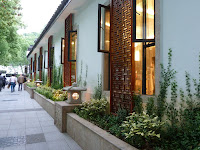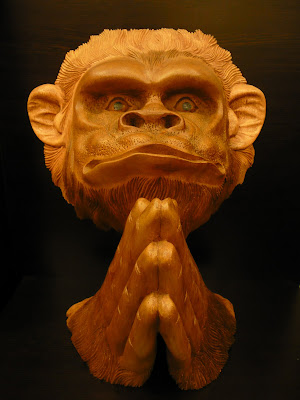 The first night in Hángzhōu 杭州, we went to its most famous restaurant serving not only authentic Hangzhou dishes but also cooked in the 正宗 zhèngzōng orthodox way. 楼外楼 lóu wài lóu is a 150 plus years old establisment sited in an grand mansion refurbished into a beautifully decorated restaurant. Many felt that it fully deserved its reputation of being the best restaurant south of the Yangtse “江南第一楼” Jiāngnán dì-yī lóu. It was unfortunate that the rooms facing West Lake 西湖 Xī Hú were under renovation or we could be having dinner taking in the lovely lake scene. Still, I was glad to be there that night and was treated to many famous Hangzhou dishes. As promised, below is the most famous dish of them all.
The first night in Hángzhōu 杭州, we went to its most famous restaurant serving not only authentic Hangzhou dishes but also cooked in the 正宗 zhèngzōng orthodox way. 楼外楼 lóu wài lóu is a 150 plus years old establisment sited in an grand mansion refurbished into a beautifully decorated restaurant. Many felt that it fully deserved its reputation of being the best restaurant south of the Yangtse “江南第一楼” Jiāngnán dì-yī lóu. It was unfortunate that the rooms facing West Lake 西湖 Xī Hú were under renovation or we could be having dinner taking in the lovely lake scene. Still, I was glad to be there that night and was treated to many famous Hangzhou dishes. As promised, below is the most famous dish of them all. During the reign of the Song 宋 Sòng dynasty 苏东坡 Sū Dōngpō became the regional official of 杭州 Hángzhōu (capital of 浙江 Zhèjiāng province). He organized the people to dredge the West Lake 西湖 Xī Hú and to build dykes to irrigate the field. In the spring of that year, some of the citizens knowing how Sū Dōngpō loved meat, sent him pork and wine. Receiving so much, he felt that he should share it and instructed his household to cook the meat for the labourer working on the dyke.
By accident, his servants added the wine to the meat while they were cooking it resulting in the pork having a most fragrant and appetizing taste. The people copied this distinctive method of cooking and named it after him. Hence, this dish became known as “东坡肉” dōngpōròu and Hangzhou's most famous traditional dish.
I stared at the thick slice of pork, two third of which is fat and hesitated to take a bite though it looked and smell so appetizing. It has a rich reddish brown lustre and an aromatic wine fragrance. My dining companion said that “this is a most sinful dish” and I have to agree. But one bite and I’m in gastronomic heaven. The rich full meaty taste was greatly enhanced by the fragrant wine and yes, the tender succulent fat. To say it was lovely was an understatement… It was more like love…






